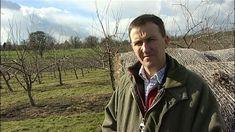
Growers are becoming increasingly fed up with the complicated requirements being added to the assured produce schemes. A number of them made their frustrations known at a well supported BIFGA (British Independent Fruit Growers Association) top fruit orchard walk in Hadlow, Kent last week.
Clive Baxter, chairman of the HDC’s Tree Fruit Panel, said that the growing industry had been in favour of a voluntary food safety initiative for consumers at the start, particularly as it had been seen at the time as a damage limitation exercise following early food scares.
“But there is growing disquiet within the fruit growing community that the assurance schemes are now too bureaucratic in their implementation,” added Baxter.
He said that most growers understood the need for these various schemes, but the audit procedures were too complicated, long winded and impractical in the verification of the question asked.
“The level of complaints that have reached the HDC Tree Fruit Panel have been unprecedented. We seem incapable in the UK of applying common sense and have become obsessed by gold plating schemes with no apparent benefit, except to our overseas competitors,” he stressed.
One of the most fervently discussed points was over the inspection in the scheme of sprayers. Growers did not see the point of going from a successful inspection to a failure within the same year; it was stated at the meeting after the farm walk that there was a 50 percent failure rate for all the sprayers tested.
Any suggestion that the total cost of sprayer inspections was £18 each for the resultant successful certificate was said to be untrue. One grower reported that he had to pay £90 each for four of the machines he had tested, while many others said the average price for a certificate was nearer £110-120.
Growers at the meeting agreed that with the increasing demands on what was supposed to be a ‘voluntary scheme’, there now had to be restraint on the Assured Farm Standards leaders to put a brake on matters.
“It is patently clear this scheme is not voluntary,” said one leading grower.
James Smith, whose family farms near Maidstone, Kent, said the risk assessment in practical terms for some jobs was nonsense. He took the example of having a locked up room or cabinet for crop protection chemicals.
“The materials are either locked up safely with a strong lock in a room or they aren’t, and I would know that,” said Smith, who added that asking further questions on whether it was safely locked was bearing down on his intelligence.
He stressed that in the end growers become jumpy as to whether they were doing the job right and this was causing stress. “Also it detracts from us doing the proper job of producing safe food,” he said.
Host grower Peter Kedge said that as around 90 percent of his top fruit sales went to supermarkets, he did not need an assurance scheme, with their high quality standards.



